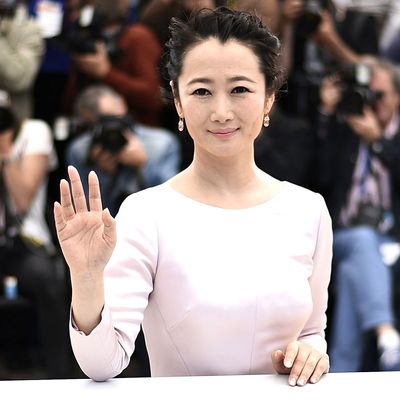
You may not have heard of Chinese actress Zhao Tao, but chances are you will during the awards ceremony at the end of this year’s Cannes Film Festival. Tuesday night, the movie she starred in, Mountains May Depart, directed by her husband and longtime collaborator Jia Zhangke (A Touch of Sin, Still Life), got a seven-minute standing ovation. And the loudest cheers and applause came for Zhao — who had tears streaming down her face. More and more, she’s looking like a likely spoiler for the Best Actress race.
Before the festival started, the smart money was on Cate Blanchett or Marion Cotillard. In Todd Haynes’s Carol, Blanchett plays a chic ’50s divorcée defying repressed times by seducing Rooney Mara’s much younger shopgirl. Cotillard plays none other than Lady Macbeth opposite Michael Fassbender. Harvey Weinstein is distributing both of them, so you know how your Oscar race is looking.
But Cannes is a different, highly political beast where the obvious choices often suffer in jury deliberations, and jurors may refrain from voting for their friends and countrymen so as not to appear biased. Remember, a three-hour Turkish film (Winter’s Sleep) won the Palme d’Or last year, when Jane Campion was head of the jury. Cannes juries are also made up of a select group of artists, and prone to emotional choices (see: Steven Spielberg’s reverie on his 2013 jury’s top choice, Blue Is the Warmest Color). That may be a strike against Blanchett. Though formally beautiful and tasteful, as Haynes films always are, Carol left plenty of critics — and this reporter — feeling cold (“… a bit studied; you long to feel some blood in its veins,” wrote The Hollywood Reporter’s Todd McCarthy). Macbeth won’t screen until Saturday, as the closing film, and it’s hard not to read into that time slot as a sign of weakness, given that festival fatigue will have long set in and half the press will have left. (Though Drive screened late in 2011 and Nicolas Winding Refn won the Best Director prize.) The argument in Cotillard’s favor is that she’s given great performances at Cannes three times in a row now — for Rust and Bone, The Immigrant, and Two Days, One Night — and left empty-handed. Advance whisperings from a sneaky few who’ve already seen Macbeth say she’s great, so this could be her year.
This year’s jury is headed by the Coen brothers and includes Jake Gyllenhaal, Guillermo del Toro, Sienna Miller, Xavier Dolan, Sophie Marceau, fabulous Almodovar muse Rossy de Palma, and Malian singer and fashion goddess Rokia Traoré. With the Coens in charge, who knows what oddball decisions this group will make, but the window for surprises in all categories seems to be wide open.
And this is where Zhao Tao comes in. Her performance is the thread that ties together Zhangke’s Mountains May Depart, a sprawling, three-part epic, set in 1999, 2014, and 2025. What’s required of Zhao is enormous. She begins the film leading a delightful group dance number to the Pet Shop Boys’ cover of “Go West” (every lyric preceded with a chant of “Together!”), and then convinces us that she’s a naïve, incredibly dynamic 20-something — Zhao is 38 — capable of inspiring a vicious love triangle between an elite future capitalist (and gangster) and her working-man best friend.
When the film skips ahead, she is a divorcée trying to reconnect with her 7-year-old son, who’s been living with his father, after a death in the family. When the film leaps to the final, English-language section, set in 2025, that son has moved to Australia and his mother is but a memory of which he cannot speak, and yet Zhao’s performance has been so central and powerful in the previous two parts that even mulling her absence was enough to bring me to tears — and then total jubilation when we get one glimpse of her as a woman alone in her 50s.
Whatever quibbles critics may have about the film itself — it’s the longest movie in competition, and any movie so ambitious is bound to make missteps (particularly the hiring of a particularly terrible white Australian actor in the final sequence) — every review seems to agree that Zhao is revelatory, giving “a gorgeous performance of uncommon grace,” as The Hollywood Reporter’s David Rooney puts it, that more than makes up for any minor bumps. The Guardian’s review ends with, “And what a wonderful performance from Zhao Tao.” And as Indiewire’s Nigel Smith tweeted: “MOUNTAINS MAY DEPART’s Zhao Tao for the Best Actress win. Best performance I’ve seen at #Cannes2015. Sorry, Cate.”
Still, it’s not a sure thing. I’ve also heard plenty of mixed reviews in the halls of the Palais. A group of British guys sitting near me in one of my screenings today found Mountains May Depart totally boring. A young critic went on a rant to Vulture Kyle (who’s also in the Zhao Tao camp) about her performance being too mannered at the beginning in her giddier younger days, and too emotive — say, letting out her grief at a funeral — in later years. That scene in particular, though, reminded me of my own Chinese grandfather’s death in Beijing, when my relatives fell to their knees and beat the bed as my American father and I wept quietly to ourselves — Chinese mannerisms and the ease of emotive expression can be a bit of a culture shock, and beautiful to behold. Zhao Tao reminded me (and others I’ve talked to) of generations of women, Chinese and not, whom I’ve met, known, and loved. If she doesn’t walk away with the Best Actress Palme — which would be a shame — that’s still an incredible win.

